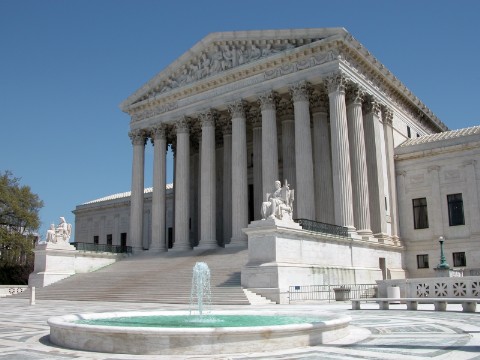 None of the four decisions issued by the Supreme Court yesterday was particularly momentous or surprising. Indeed, the most interesting aspect of its actions was that it deepened the mystery that has intrigued Supreme Court tea readers in recent weeks: who is authoring the long-awaited decision in Brown v. Entertainment Merchants Assn, the violent video game case? The Court also bid a final good-riddance to Bill Lerach, the disgraced securities class action lawyer.
None of the four decisions issued by the Supreme Court yesterday was particularly momentous or surprising. Indeed, the most interesting aspect of its actions was that it deepened the mystery that has intrigued Supreme Court tea readers in recent weeks: who is authoring the long-awaited decision in Brown v. Entertainment Merchants Assn, the violent video game case? The Court also bid a final good-riddance to Bill Lerach, the disgraced securities class action lawyer.
Brown is the sole undecided decision from the Court’s November sitting. The only two Justices who have not authored majority opinions from that sitting are Justices Alito and Sotomayor, so one might ordinarily conclude that Brown is being authored by one of those two. But the Court today announced that another November case, Flores-Villar v. U.S., was affirmed by an equally divided court (with Justice Kagan recused). Had the initial vote in the case been 4-4, the Court would have announced that division soon after the November 10 argument. The Court’s seven-month delay in releasing its decision suggests that a Justice has been writing a majority opinion, only to lose that majority when another Justice switched sides. Given the ideological nature of Flores-Villar (the Petitioner alleges sex discrimination in determining U.S. citizenship), it’s reasonable to suspect that the Court lined up along its usual liberal-conservative divide, with Justice Kennedy somewhere in the middle. My guess: Justice Alito was assigned to write the opinion for a 5-3 majority, but then Justice Kennedy switched his vote, thereby creating a tie.
The Brown v. Merchants authorship mystery is deepened by the fact that Flores-Villar is not the only November case in which the Court, after a considerable delay, issued a decision affirming by a 4-4. The same thing happened in December in Costco Wholesale. Moreover, Scotusblog’s Tom Goldstein speculates that Justice Sotomayor may have initially been assigned the majority opinion in yet another November case, Tohono O’Odham Nation, but later lost her majority to Justice Kennedy, the author of the April 22 decision in that case. (Justice Sotomayor wrote a lengthy concurring opinion that may once have been a majority opinion.) If either Costco Wholesale or Tohono O’Odham Nation was originally assigned to Sotomayor, it is unlikely that she would have been assigned the Brown case as well. And Alito is not a likely author of Brown, which raises First Amendment issues; Alito’s views on suppressing potentially harmful speech are not in sync with those of his colleagues.
My best guess: I agree with others who have speculated that Chief Justice Roberts assigned the Brown decision to himself, and is writing a decision striking down California’s restrictions on violent video games. That would give him two opinions in November, but he had only one in the October session and one in the December session. His moderately strong support for First Amendment rights places his views comfortably within the mainstream among current Justices. And given his authorship of several important First Amendment decisions in recent years, it would hardly be a surprise if he decided to assign this one to himself.
The Court’s other noteworthy action today was its order disbarring securities lawyer Bill Lerach. As a partner at Milberg Weiss, Lerach made a name for himself as a self-appointed supposed champion of shareholders fighting against corporate malfeasance at Enron and elsewhere. He pled guilty in 2007 to federal criminal charges and was sentenced to two years in prison. The California State Bar disbarred Lerach in 2009. Today’s Supreme Court action drives the final stake in his legal career. Good riddance.
